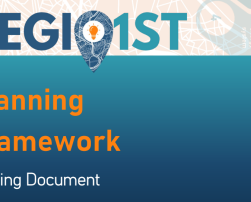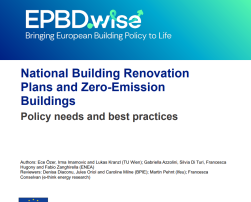
Machine learning optimises energy efficiency in green buildings
A machine learning-based model significantly enhances energy efficiency in green buildings by accurately predicting and reducing energy consumption for cooling and heating.
Luca Papapietro

iBRoad2EPC Assistant software
This report describes the IT implementations of the iBRoad2EPC back-end tool.
Marianna Papaglastra

The Life Cycle Global Warming Potential in the EPBD
The Life Cycle Global Warming Potential factsheet from the World Green Building Council provides guidance on EPBD measures to reduce buildings' total carbon emissions, including a timeline, checklist, and recommendations for effective national regulations.
Luca Papapietro

Innovative facade materials for heat management
Advanced building facades can reduce energy consumption through cutting-edge fabrication techniques that enhance solar and thermal heat management.
Luca Papapietro

Accelerating deep renovation in the EU with renovation passports
This publication is an EU roadmap proposing concrete measures to maximise the uptake of iBRoad2EPC schemes to achieve the EU’s decarbonisation goals.
Carla Mauricio Planas

Regio1st releases a guidebook to navigate its Planning Framework helping regions in their energy plans
Soon after the release of its Planning Framework, the Regio1st LIFE-CET project is now releasing a guidance helping regional energy planners in Europe to develop and implement sustainable, cost-effective energy strategies while prioritising energy savings in buildings and energy efficiency solutions in line with the EE1st principle.
Roberta D'Angiolella

National Building Renovation Plans and Zero-Emission Buildings: policy needs and best practices
National Building Renovation Plans (NBRPs) and zero-emission buildings (ZEBs) are recent additions to the revised Energy Performance of Buildings Directive (EPBD 2024/1275). This report examines the policy requirements for implementing NBRPs and ZEBs in the focus countries of the EPBD.wise project: Bulgaria, Greece, Hungary, Poland, Romania, and Ukraine.
Carla Mauricio Planas

European Energy Efficiency Guide 2024
EAE’s Energy Efficiency Guide is a meta-study that summarises relevant facts and figures about the energy efficiency of Europe’s building stock, relevant legislation, technical developments and how ETICS contribute to achieving Europe’s environmental, economic and social objectives. It condenses the evidence of numerous global, European and national scientific studies and provides recommendations on what can be done to triple the number of buildings undergoing deep or staged deep renovations or new buildings to become net carbon neutral by 2050.
Ralf PASKER

EPBD Article 9 – Minimum Energy Performance Standards (MEPS) and trajectories for progressive renovation: Policy needs and analysis of good practice examples
Minimum Energy Performance Standards (MEPS) are new policy components introduced in Article 9 of the revised Energy Performance of Buildings Directive (EPBD 2024/1275). This report examines the policy requirements for implementing MEPS in the focus countries of the EPBD.wise project: Bulgaria, Greece, Hungary, Poland, Romania, and Ukraine.
Carla Mauricio Planas

Implementing Renovation Passports: Policy needs, status quo and best practices
Renovation Passports are a newly introduced feature in the updated Energy Performance of Buildings Directive (EPBD 2024/1275). This report examines the policy requirements related to the implementation of Renovation Passports in the focus countries of the EPBD.wise project: Bulgaria, Greece, Hungary, Poland, Romania, and Ukraine.
Carla Mauricio Planas